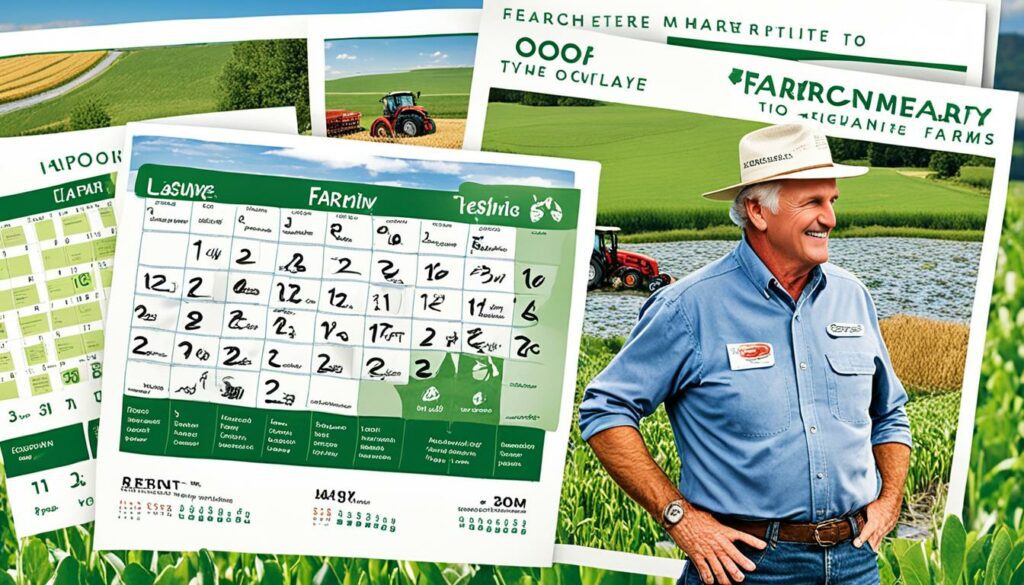Menu

Did you know farmers work over 70 hours a week? This is way more than the usual 40 hours. The agricultural industry is demanding, requiring long hours for planting, harvesting, and looking after animals. This often blurs the line between work and personal life.
Unpredictable weather and market changes make it even harder to find balance. Farmers can easily feel stressed, burnt out, and overwhelmed. Doing physical work all day and meeting market demands add a lot of pressure.
But, there are strategies to help. Farmers can start with daily silent mornings and weekly family tours. They can join local meetups and take “farm-free” weekends every few months. Setting goals not related to farming yearly and establishing work shutdown routines also help. These practices boost personal well-being and productivity.
Keeping a balance between work and life in farming is tough. Agricultural workers face stress from many areas. This stress can hurt their health and make it hard to also enjoy time with family and friends.
The weather is a big source of stress for farm workers. Changes in weather can mess up their plans. This makes it hard to be consistent in their work and also spend time with loved ones. It can lead to burnout.
Farmers also deal with pressure from the markets. Prices for their crops can change a lot. They have to work hard to meet their production goals. This, combined with the physical work, leads to a lot of stress.
Farmers often do not have enough time to relax. They need good strategies to manage this stress effectively.
Living in the countryside can be lonely. It can feel like there is not enough support. This loneliness and lack of support makes it hard to enjoy life outside work. Farmers may find it tough to spend time with their families.
Community support and seeking help are important for a balanced life on the farm. This support can help with the stress of working in agriculture.
Using resources like the NDSU Extension and the North Dakota Dept. of Agriculture can help. It’s vital to plan, communicate, and set goals well. These steps are key to a successful work-life balance in agriculture.
Starting your day with silence can truly transform your life. This is especially important for those in agriculture. They spend long hours working, often neglecting their personal lives and rest. Finding peace in such a busy life is essential.

Morning meditation, deep breathing, or introspective silence for 15 minutes helps stabilise your emotions. It prepares you for a day full of challenges. These challenges range from the weather to market needs and the physical demands of farming. So, starting your day in silence ensures you’re mentally ready.
My own experience proves that these small daily practices make a big difference. A “Silent Start” isn’t just a nice idea – it’s a key step for better rural living. It helps me balance farm work with my personal life. These moments of quiet in the morning set a positive tone for the day.
Weekly farm tours are great for everyone. They help the family and the farmer. This time spent together leads to a better life-work balance. It also helps the family learn more about farming while getting closer and being free from daily farm work.
Taking an hour each week to tour the farm helps teach your family. They learn about things like different crops and why farming sustainably matters. It’s a chance for them to get hands-on with farming. This can make them really interested in and grateful for farm life.
These tours are not just about learning. They are a special time to build family bonds. Doing fun activities not related to work makes everyone talk more and feel closer. It means sharing quality time which is key for a good life and work balance.
Also, by making tours a regular part of your week, you make sure to spend time with your family. This is important alongside other things like meeting local farmers once a month and having weekends free from the farm a few times a year.
| Activity | Frequency | Duration |
|---|---|---|
| Family Farm Tours | Weekly | 1 hour |
| “Silent Start” Routine | Daily | 15 minutes |
| Local Farmer Meetups | Monthly | Varies |
| “Farm-Free” Weekends | Quarterly | 2 days |
| Non-Farm Goals | Annually | Varies |
| Work Shutdown Ritual | Daily | Varies |
Adding farm tours to your schedule shows the benefits of having set times. Times set aside for family without farm work are critical. This balance is vital for your well-being, the farm’s success, and for a sustainable farming life.
Monthly local farmer meetups are a great way to relax and share important ideas. They help tackle the challenges farmers face, like bad weather and hard work. These gatherings build a strong sense of community and support.

Talking about farmer self-care strategies at these meetups is key. It creates a space where farmers can freely discuss stress management. By sharing tips and new methods, we help each other find better ways to care for ourselves.
Fighting agricultural stress is a group effort, not solo. These meetups form a supportive community. They encourage farmers to open up about their ups and downs. This sharing lessens the loneliness often felt in rural areas and promotes both personal and farm health.
| Monthly Meetup Activities | Benefits |
|---|---|
| Experience Sharing | Provides new insights and practical solutions |
| Stress Management Discussions | Helps in identifying and managing stressors |
| Networking | Builds a supportive community |
| Guest Speakers | Offers expert advice and innovative ideas |
| Workshops | Enhances skills and knowledge |
In farming, taking breaks is important for a balanced life. I’ve learnt that setting aside time each season for a break is key to feeling good and keeping family ties strong. Such breaks stop me from getting too tired and help me love farming more.
It’s vital to plan these weekends early to not let the farm suffer when I’m away. The law, Public Law 115-334 citing 132 STAT. 4490, impacts farming a lot. It shows the government cares about farmers’ well-being. It includes things like caring for the land and helping local food projects. Knowing about this helps me take time off without worries.
Breaking away from the farm four times a year fits well with efforts for rural happiness. Programs like the Vodafone Farmers’ Club, popular with 200,000 farmers by December 2016, show how coming together helps. It found that joining the club improved how farmers take care of the land.
The 90% confidence interval states that many farmers in Ghana lack negotiation power. It’s key for me to use these farm-free weekends to think about boosting my skills, not just chill.
Taking regular breaks helps my mind and lets me see farming in new ways when I’m back. Notably, women in support roles have made diet changes, showing how beneficial breaks are. These efforts remind me that life isn’t just about work on the farm.
| Statistical Data | Impact |
|---|---|
| Vodafone Farmers’ Club | 200,000 Users Registered by Dec 2016 |
| Power Users’ Land Management Practices | 1.7 times more likely to report changes |
| Women as Power Users | 16% report nutritional practice improvements |
In summary, adding farm-free weekends to my schedule is vital. It keeps me strong and efficient in my farm work while supporting well-being in the countryside. These off times are not just a luxury; they are a smart move for success and happiness in farming.
In the busy world of agriculture, having goals outside farm work is key. It brings balance to life. This, in turn, boosts wellbeing and overall health.
Setting health goals is vital. They help us focus on staying healthy, including our mind. Achieving these aims reduces stress from farming. It ensures we’re in great shape for daily life, especially for those managing family and farm.
Learning new things can help our mental health. This can be playing an instrument, picking up a new language, or starting a creative project. These activities offer a break and help us grow and find joy. They make life more interesting.
Organising these goals can be beneficial. It helps to mix health and learning targets for a fulfilled life away from the farm. Here’s how you can plan:

| Annual Goal Category | Objective | Frequency |
|---|---|---|
| Personal Health | Regular Exercise (three times a week) | Weekly |
| New Skills | Learn a new language | Monthly progress check |
| Hobbies | Engage in a creative endeavour (painting, woodworking) | Weekly sessions |
Adding these personal goals to your year helps in many ways. It boosts your satisfaction and keeps life balanced. This fits well with the challenge of managing both family and farm life. It ensures your own growth and mental wellbeing are looked after.
As a farmer, I often find myself stuck in the farm’s never-ending work cycle. The long days of planting and harvesting often blend into my personal time. To make sure I truly switch off from work, having a special ending to my day is crucial.
This ritual marks the end of work and the start of my free time. It’s vital for keeping farming life manageable and my time organised. The secret is to keep it simple and do it every day.
One good way is to spend a few minutes at the end of the day getting things in order. You can tidy your workspace, plan what you’ll do the next day, or even take some time to just breathe. These small acts tell your brain that work time is over.
Technology can also help make this routine easier. Online tools can help you list what you’ve done today and what you want to do tomorrow. This complements the physical side of putting your tools away, making the end of the day feel more complete.
Adding moments with family makes this ritual even better. Doing something together after work, like walking around the farm or having dinner with family, makes the farm life richer. It combines finding balance with family time.
“A good end-of-day routine boosts how well you work and how happy you are. It keeps your work and personal lives separate, making both parts better.”
In the end, these small routines help me keep a healthy balance between work and life. A solid work shutdown ritual makes my evenings calm. This way, farming doesn’t take all my energy, and I still get time to relax.
By limiting farm work hours, we can improve our work-life balance. Modern tech, like automatic milking systems, is making a big difference. In Western Europe, these systems boosted money-making and made work more efficient.

The harmony between farm work and personal life is crucial. Norway saw fewer dairy farms but better cow productivity. By 2017, nearly a quarter of their dairy farms used AMS. Half of their milk came from these farms.
AMS makes managing farm work time better. It moves farmers from long, tiring days to more structured ones. It also helps lower their work stress and prevents exhaustion.
With AMS, farmers can have more personal time and a sustainable lifestyle. They can balance work with family and personal needs. This change values farm output and the farmer’s well-being.
Now, experts are looking into how AMS affects farmers’ lives. They’re studying its impact on their income, happiness at work, mental health, and family time. Using these systems and setting work limits helps farmers find a better balance.
| Parameter | AMS-using Farms | Non-AMS Farms |
|---|---|---|
| Labour Efficiency | Increased | Standard |
| Financial Performance | Improved | Standard |
| Work-Life Balance | Optimised | Challenged |
| Milk Production | 50% Contribution | 50% Contribution |
In farming, it’s vital to recognise our worth and keep our passion alive. We need to balance our family life with the demands of the farm. This helps to look after our own well-being and the farm’s financial health.
Looking after your farm’s finances is crucial. It involves working closely with customers, CSA members, and everyone else involved in the farm. Talking to 150 farmers on a podcast showed me how important financial stability is. It not only keeps the farm going but also ensures farmers can balance work and life.
Consider the Tourne Sol Co-Operative Farm in Quebec. They let their staff leave early on Fridays. This move actually made them more efficient. It shows that making smart choices about work and schedule can help with work-life balance.
As a farm owner, you might work double the hours of others. This highlights the need to look after yourself. Using tools like Mobble’s farm management software can help. They make tasks easier and the farm run smoother.
Another key is regular team check-ins. Discussing work and plans as a group can boost everyone’s morale and efficiency. It’s these small but organised talks that really make a difference.
Also, getting help from places like the Farm Owners Academy can be game-changing. They offer advice on setting and reaching goals. This helps to focus on both personal and financial health.
| Strategy | Benefit |
|---|---|
| Early Friday Leave | Increased Efficiency |
| Using Mobble Software | Improved Productivity |
| Weekly Check-ins | Boosted Motivation |
| Farm Owners Academy | Goal Achievement |
Farming is more than just hard work. It’s about managing your time, efforts, and personal needs well. Successful farms often rely on community support. This shows how important it is to value yourself for a sustainable farming life.
Good communication is key for a strong team in farming. When everyone talks openly and clearly, there are fewer mistakes. This makes jobs run smoother and makes the team work together better.

Telling your staff what you expect stops mix-ups and fights. This is very important when it’s the busiest time of the year. Make sure everyone really understands their job. This stops errors and helps create a nice work environment.
Use things like whiteboards, notes, and chat apps to keep messages clear. Also, pay attention to how you say things without words. This can be just as important as what you say.
Dealing with arguments in a family farm is just as vital. Good ways of talking can settle fights and keep relationships strong. Talking every day, asking open questions, and making sure jobs are clear can stop a lot of problems.
Sharing good times and doing nice things, like baking, can lift everyone’s spirits. And, teaching everyone to communicate well can make your farm a happier place. This keeps stress down and helps work get done better.
Farming is often seen as independent work. But, to succeed, farmers need support from their community. This was clear at the Pennsylvania in the Balance Conference. Producers there shared key strategies for finding a good balance between work and life on the farm. They pointed out the importance of local leaders in agriculture. These leaders help push forward on projects that improve water quality and support conservation efforts.
Supporting small family farms is vital. They are important for our culture, history, and the quality of life we enjoy. The USDA’s Conservation Stewardship Program plays a big role in this support. It’s the largest conservation programme in the country and is open to farmers in Pennsylvania. The conference also talked about easing regulations. Measures like “ag certainty” encourage more farmers to join conservation efforts.
Pennsylvania has strict farming regulations, requiring detailed certification programmes. These uphold strong conservation standards. The state can look at how other places, like Virginia and Minnesota, do this. Making a demand for products from “clean water” sources can also motivate farmers to get involved in these programmes.
Working towards a better life on the farm includes using help from the community. A study found that 75% of farmers find it hard to balance work and life. They especially struggle with managing time for their families. Many pointed out that setting time aside for family, like on Sundays, is crucial for a balanced life.
Sharing practical tips can also make a big difference. This includes getting help for household chores and using new technologies like farm cameras and robots. It’s about setting priorities and planning family time. This way, farmers can find what works best for their farm and their family.
Farming and ranching bring their own set of challenges. These include uncertain markets, changing weather, hard physical work, and sometimes being alone. It’s vital to identify what makes us stressed and find healthy ways to deal with it. This keeps our work and life in balance.
Agriculture is a risky field in the United States. It’s filled with challenges:

We can tackle these issues head-on. This means working on both farm and personal strategies:
Good coping methods help everyone work better and feel happier. This leads to more success on the farm. By being ready for stress, we can lead a better, more stable life on the farm.
Wrapping up, we see how key these tips are for your wellness and farm growth. Living a sustainable farm life is good for you personally. It helps you feel better and balances life more. Things like quiet mornings, family tours, and community meetups matter a lot.
Research from the American Farm Bureau Federation and Morning Consult is uplifting. It shows people in farming are thinking more about mental health. Talking openly and getting help is easier now. Groups like AgWell and CAAMHP offer great support. More farmers are reaching out and telling their stories. This shift points to a caring and open farm community.
It’s vital to care for yourself and loved ones while keeping your farm strong. In doing so, you not only look after your health but also help your community thrive. Setting a good balance between work and life is a goal worth pursuing. It adds value and joy to your life, making all the hard work meaningful.
Start the day quietly with a “Silent Start” routine. Take your family around the farm every week. Meet other local farmers often. Try to take short breaks away from the farm several times a year.
Have goals outside of farming. At the end of each day, make sure to shut off work. Limiting how long you work each day also helps.
Weather changes can mess up your plans, making it hard to relax. But, by being ready for changes and not sticking to strict schedules, you can lower your stress.
Farmer meetups offer a chance to share advice and stories. This helps build a strong community that can lessen the challenges of farming. It makes dealing with stress easier.
Starting the day in silence with activities like meditation can calm your mind. This makes you more prepared to handle whatever comes your way. It is good for keeping stress in check and staying focused.
Family tours on the farm teach about your work and bring you together. It’s a chance to enjoy time with loved ones without thinking about the farm. This helps make your family life happier.
Having goals not related to farming adds variety to life. It encourages growth and offers a break from the farm. This all boosts your overall health and well-being.
Ending your workday with a routine helps switch off your mind from work. It’s key for a balanced life, making sure work doesn’t spill over into personal time. This helps maintain a healthy work-life balance.
Talking clearly with your team and family avoids misunderstandings and fights. Good communication is vital, especially in busy times. It helps things run smoothly and keeps your relationships positive. This is crucial for a balanced life.
Working fixed hours boosts your concentration and prevents tiredness. It makes you more efficient and keeps you healthy. This is a great way to improve your effectiveness and well-being.
Financial security is key for your farm and your own health. It lessens worry, letting you focus on taking care of yourself and enjoying your job.
Figuring out what causes your stress is the first step. Then, taking regular breaks, connecting with others for support, and using calming techniques can help. These strategies are crucial for staying healthy and happy.
To balance work and home, manage your time well. Plan activities with your family, set clear limits on work, and involve your loved ones in learning about the farm. This ensures you get quality time with your family and are less stressed.